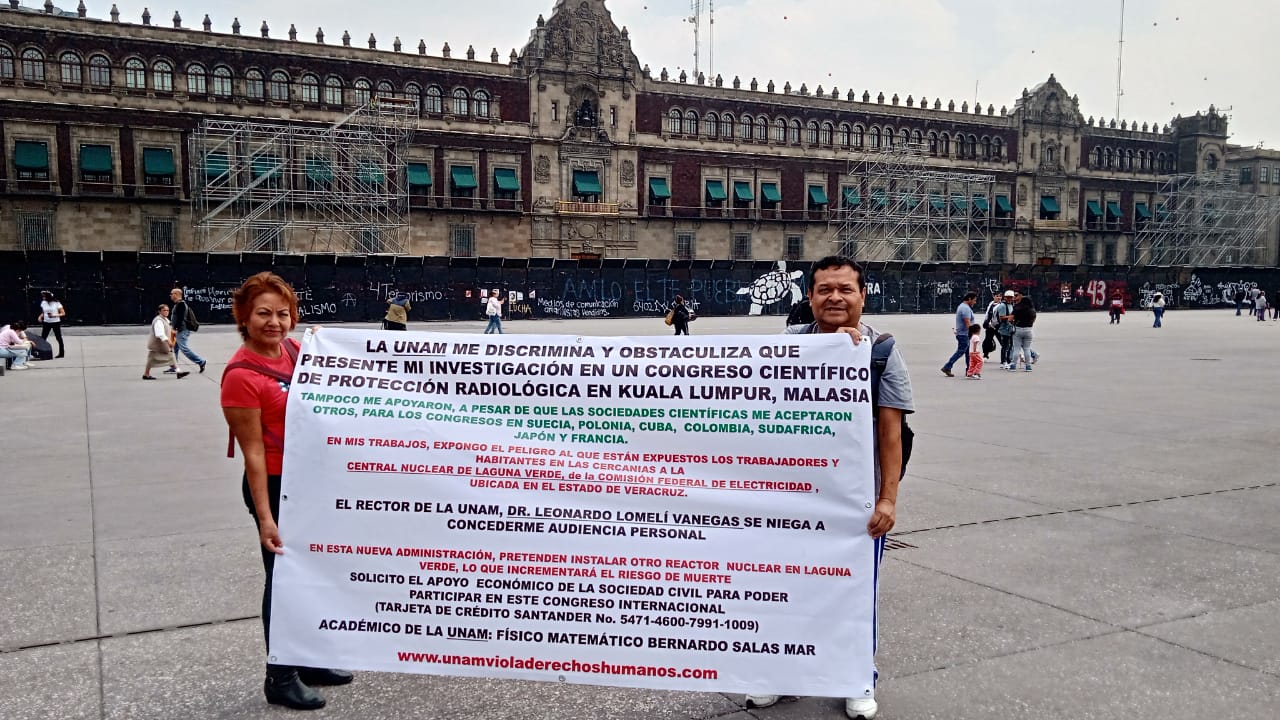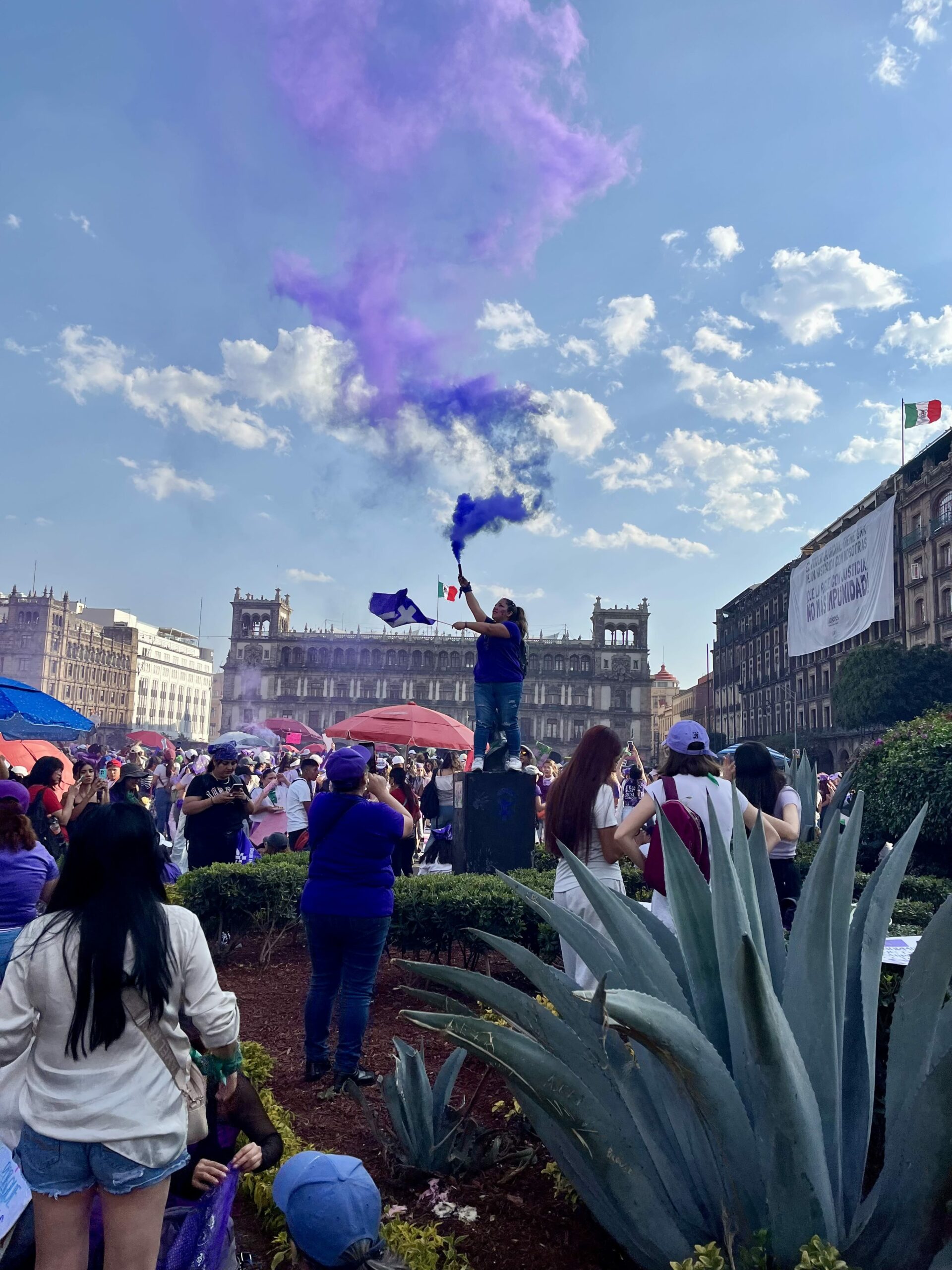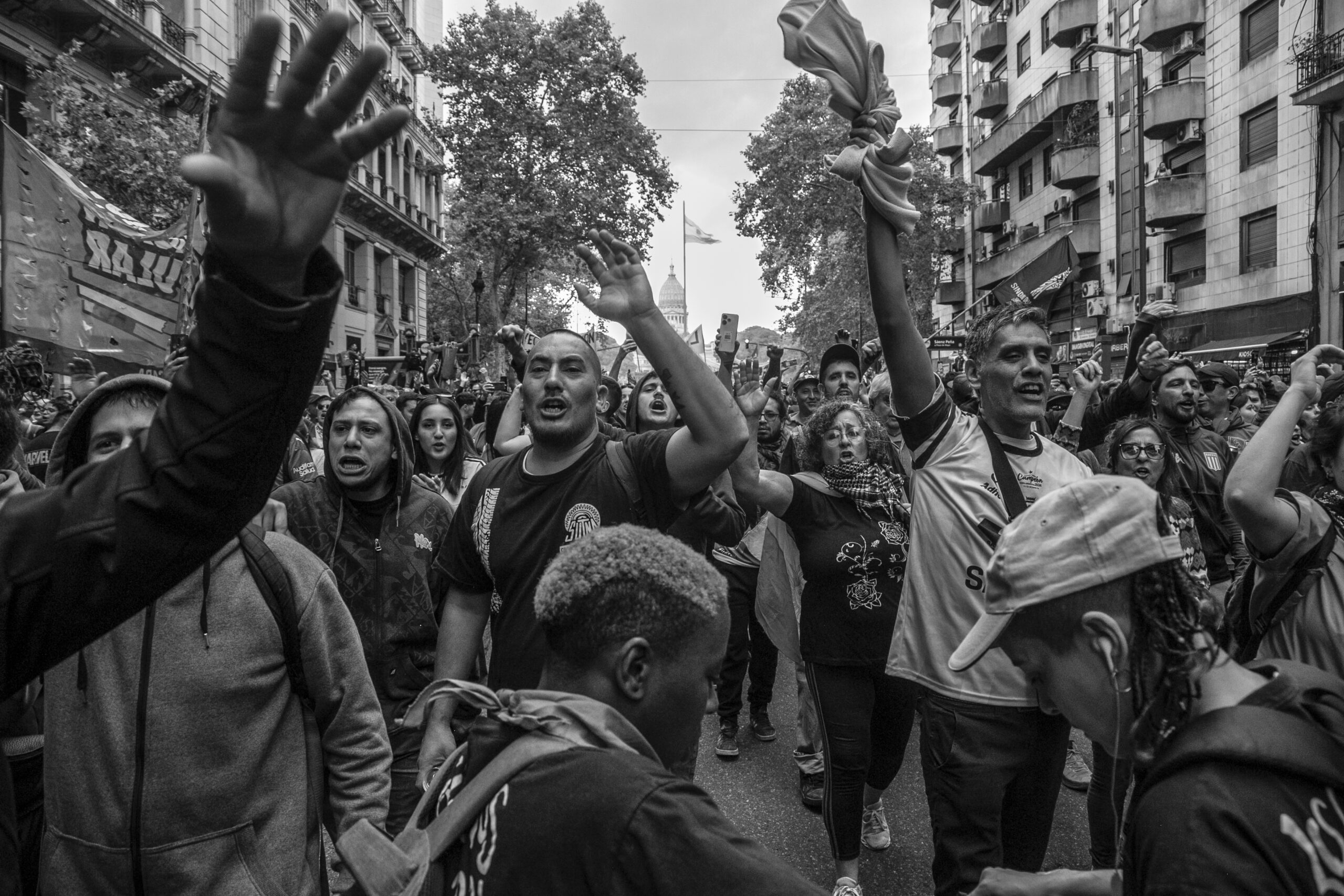Imagine being informed by a Facebook news site that your loved one has been arrested as a gangster. That’s what happened to the families of Luis Angel Quintana and Ilse Elizabeth Ramirez. The residents of the Mexican tourist town of Zihuatanejo, Guerrero, were stunned to learn second-hand that their relatives had been picked up in a February 12 police-military operation and accused of serious charges related to organized crime.
Michell Quintana found out about the arrests of her brother Luis, 26, and his girlfriend Ilse, 27, from a cousin who read the news on Facebook that night and immediately contacted her.
“We are still in shock. We can’t believe he’s been detained. He doesn’t know (the other suspects). He’s focused on his music, his group,” the sister said.
Ilse and Luis first met in high school and are respected members of Zihuatanejo society. Luis is the bass player for Expresion Immune, a rock group popular among both locals and the many foreigners who visit or live in the Ixtapa-Zihuatanejo area.
Gaviani Ramirez said his sister was the first in his family to successfully pursue a professional career and land a job with a bank. For two years, Ilse lived in Playa del Carmen on the Maya Riviera south of Cancun but recently returned to Zihuatanejo, where she moved in with Luis.
“She’s worked and studied since she was very young,” the older brother said. She’s the only one who’s achieved a career in our family. She had to leave Zihuatanejo because it was difficult here. She comes back and everything is taken away.”
Luis and Ilse were considering marriage when their lives were turned upside-down on Feb 12, according to Quintana.
In interviews, Quintana and Ramirez said relatives went to the local headquarters of the Office of the Federal Attorney General (PGR) the same evening of the arrests but were informed that the detainees had been moved to a prison near Acapulco. Neither Luis Quintana nor Ilse Ramirez were allowed to make a phone call home prior to the transfer, according to their sister and brother.
Guerrero state police raided the modest apartment in Zihuatanejo where Luis and ilse lived the morning of Feb. 12. The police reportedly spotted a taxi with armed men and pursued the vehicle to the living complex. In the official statement, the PGR said police discovered AR-15, AK-47 and Uzi automatic weapons, bullets and clips inside the complex.
According to the federal agency, nine people, six men and three women were detained on illegal weapons charges and jailed in Acapulco. Two of the detainees were former municipal cops, the PGR said.
Some press accounts linked the detainees to the Guerrero Guard, one of several organized crime groups battling for control of Zihuatanejo and the Costa Grande of Guerrero state.
But Quintana and Ramirez insist that their siblings, who had recently moved into the apartment, lived separately from the other suspects, did not know the rest of the detainees and were not involved in delinquent activities.
“I don’t think it’s just about the PGR involving innocent people even though proof of innocence has been shown,” Quintana said, adding that work documents, personal testimonies and even a fingerprint test of the confiscated weapons all attest to the innocence of Luis and Ilse.
Pressed on the issue, Mayor Gustavo Garcia Bello told reporters in Zihuatanejo last month that he would help provide legal support to Quintana and Ramirez.
“I am going to support them as a lawyer, as a human being, but the mayor as such has nothing to do with this,” Bello was quoted in the Acapulco-based Internet news site Laplazadiario.com
More than one month after they were arrested, Quintana and Ramirez remain detained in Acapulco without bail under a Mexican law, el arraigo, that allows the government to hold suspected individuals for up to 90 days before a decision is made whether or not to proceed with criminal prosecution.
If there is any bright light in an obscure spot, the couple has been treated relatively well by custodians and inmates and not endured torture, as is frequently the case with detainees in Mexico, Ramirez said.
Friends and Fans Rally behind Luis and Ilse
Luis and Ilses’ arrests have inspired a support movement that’s gone international. Since February, public protests, petitions and benefit concerts have demanded the couple’s release. Posters for a February 26 march that called for justice still hang in the streets.
Zihuatanejo’s world-renowned musical duo, Rodrigo and Gabriela, who performed at Barack Obama’s White House, have joined other musicians in demanding freedom for Luis and Ilse.
A link to a change.org petition on Zihuatanejo.net, an Internet site and message board popular with expats, snowbirds and tourists, has garnered more than 700 signatures, according to the latest count.
Publicity about the case of Isle and Luis sparked debate on the message board about Article 33, the prickly section of the Mexican Constitution that prohibits the involvement of foreigners in the country’s politics. Article 33 was invoked during the 1990s in the deportations of foreigners immersed in solidarity movements with Chiapas’ Zapatistas.
Writing on the message board, site administrator Rob Whitehead took issue with a view that Article 33 applied to Ilse and Luis’ case. Although Whitehead cautioned against foreigners participating in marches, he said other actions were appropriate.
“We can sign the petition for their release. We can continue to donate to their funds. We can make others aware of their plight. I and others feel the more light that is shone upon this, the more the Gov’t will need to take action to rectify the situation,” Whitehead wrote.
For Ramirez, the much-welcomed support has not yet reached critical mass. Many local people are still afraid to stick out their necks, he said. Ramirez suspects his phone was tapped, and finds it curious that he could not post on Ilse’s Facebook for a week after her arrest. A review of recent events quickly reveals why many might be reluctant to speak out against a situation smacking of injustice.
Violent Backdrop to the February 12 Arrests
If Ramirez and Quintana had lived in another place at another time, it’s unlikely they would be sitting in jail. But stunningly beautiful Zihuatanejo, graced with breezy palms, enchanting sunsets, bright hummingbirds and friendly people, is also a highly coveted piece of geography. It’s the a point of convergence of sea lanes that funnel cocaine north, highways that transport the products of clandestine synthetic drug labs, and roads winding down from the opium-rich Southern Sierra Madres to deliver heroin to the world beyond.
The nearby port of Lazaro Cardenas, Michoacan, provides a critical link in the nexus of South America-China-Mexico-U.S. commerce. Foreign investors reportedly eye deposits of gold and silver in the same mountains where plantings of opium poppies flourish. Illicit drug trafficking that heads from the Costa Grande to the US market also provides the scrapings of the bag for the narco-menudeo, or street-level drug dealing, in Ixtapa-Zihuatanejo.
In short, there’s money to be made in this burg. Not surprisingly, violence has flared. In February and March, the Mexican press and local residents reported gun battles between different organized crime groups, the kidnapping of Guerrero Governor Hector Astudillo’s representative in Zihuatanejo, public executions, and the separate dumping of two bodies in front of city hall.
The Guerrero daily El Sur reported at least 25 gangland-style homicides in the municipality from January 1 to March 18. Despite frequent patrols of heavily-armed soldiers, marines, state police and municipal cops, the bloodletting continues.
Around town, a few banners demanding “Peace with Order” are still on display from a business owners’ one-day work stoppage held in protest of crime and violence last year.
Violence in Zihuatanejo and Guerrero has undermined the possibility of social movements to freely act and curbed the ability of reporters to cover them. After a spate of gunfire the weekend of March 10-12, supporters of Ramirez and Quintana cancelled a march scheduled for that Sunday. According to Michell Quintana, the rising insecurity made it too risky to stage a public demonstration.
Journalist Hercilia Castro, who has reported on the region for La Jornada, Laplazadiario.com and other publications for many years, says she’s noticed a shift in the nature and tone of demonstrations, with less people willing to identify themselves and more having to obtain the prior “permission” of shadowy forces to express themselves in the streets.
“This speaks to the degree of deterioration” Castro said. The Guerrero reporter also cited an instance in which she was openly warned not to take photos in a town up the coast from Zihuatanejo.
“How can I work as a journalist and not take photos?” Castro questioned. “I felt bad.”
Guerrero journalist Cecilio Pineda was murdered March 2 in Ciudad Altamirano, a town on the other side of the Southern Sierra Madres from Zihuatanejo. Based in the narco-saturated Tierra Caliente, Pineda was known for his drug-related stories and postings on Facebook. Almost immediately prior to his murder, he posted a video denouncing the probable coalition of police and politicians with a criminal group called Los Tequileras.
Pineda had suffered an attack in 2015 and was assigned police protection for a time, but apparently decided to remain in Tierra Caliente. Quoted in El Sur, Guerrero State Prosecutor Javier Olea stated that Pineda was “definitely” murdered by organized crime. The PGR is reportedly now involved in the investigation of Pineda’s murder, but no arrests have been made. For the umpteenth time, reporters staged protests in Zihuatanejo, Acapulco, Chilpancingo and Iguala.
“Deadly violence against the press is severely restricting the Mexican media’s ability to report the news,” said Carlos Lauría, the New York-based Committee to Protect Journalist’s senior program coordinator for the Americas. “Mexican authorities must investigate this crime exhaustively and prosecute anyone who had a role in the murder of Cecilio Pineda Brito.”
The Impact on Families
Quintana and Ramirez consider their sibling’s case part of the bigger picture in Mexico. Michell compares the February 12 arrests to the case of Teresa Gonzalez, Alberta Alcantara and Jacinta Francisco–three indigenous women who wasted away years in prison for allegedly kidnapping six federal police officers in 2006.
After a panel of the Mexican Supreme Court unanimously declared the women innocent, the PGR, in an unusual mea culpa, held a public ceremony earlier this year in which the federal government apologized for unjustly imprisoning the women. However, as Proceso columnist Marta Lamas recently wrote, it’s not publicly known what happened to the six officers at the center of the frame-up.
Lamas questioned: “Were they suspended? Transferred to another location? Do they continue in service? Were they charged with responsibility for what happened?”
According to Quintana and Ramirez, the jailing of Ilse and Luis has emotionally, physically and economically devastated two families.
Forced to spend time away from home, the parents have missed work, relatives have suffered sickness and sleeplessness, and costs for legal and living expenses (Ilse and Luis must pay for food and water in jail) have piled up. Quintana said she is now behind in her class work.
“It is hard for people like us with few resources,” the 20-year-old university student said. “(Officials) are not only ruining (Luis and Ilses’) lives, but those of the whole family.”
Ramirez admitted that he had been fatalistically resigned about other causes before the detention of his sister and her boyfriend. He said the incident “opened my eyes” and propelled him into action.
“If we are in this situation, what awaits the next generation?” he mused. “Until it happens to you, you don’t know where you are at. We’ve had kidnappings, disappearances and femicides… We supposedly live in a democracy. I have my rights. I demand that the governor, the federal government get involved. We are citizens. Without us, the politicians are nothing and we are nothing without them.” As the so-called drug war intensities in Zihuatanejo, friction is developing between locals and the various security forces deployed ostensibly to restore peace and order.
In March, for instance, Zihuatanejo municipal employee Yovan Fajardo filed a complaint with the official Guerrero State Human Rights Commission alleging that his rights were violated after a state police patrol stopped him in his vehicle, forced him out of the car and hit him in his stomach and face in front of his wife.
Speaking to local reporters, Fajardo acknowledged that he was fearful of speaking out but felt it was necessary to act. “I am afraid but I have faith that only the people can help the people, and if we join together and raise our voices, I believe that something will be accomplished; something has to be done,” he was quoted in Laplazadiario.com
Zihuatanejo and the case of Luis Quintana and Ilse Ramirez stand as another important test of the rule of the law, respect for human rights and the prospects for democratic change in Mexico. The fabrication of scapegoats in the murders of women in Ciudad Juarez and Chihuahua City in recent years, and the unjust imprisonment of Teresa Gonzalez, Alberta Alcantara and Jacinta Francisco show that in Mexico the jailing of innocents is all but institutionalized as part of a justice system purportedly undergoing reform. And the fact that citizens do not feel secure in publicly expressing their opinions denotes a step backward from the goal of a more participatory and robust civil society.



